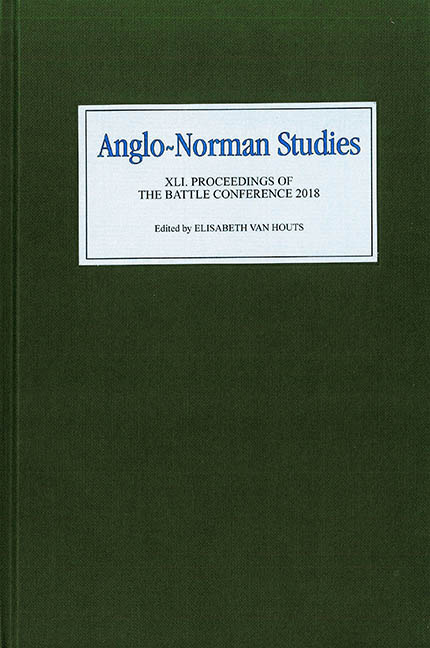Book contents
- Frontmatter
- Contents
- Illustrations and Tables
- Editor's Preface
- Abbreviations
- Horses, Knights and Tactics (The R. Allen Brown Memorial Lecture, 2018)
- Baldwin of Forde, Bartholomew of Exeter and the Authorship of the Liber de sectis hereticorum et orthodoxe fidei dogmata
- Evidence of the Ordinary: Wives and Children of the Clergy in Normandy and England, 1050–1150
- Anthropology, Feud and De obsessione Dunelmi
- New Archaeologies of the Norman Conquest
- An Angevin Imperial Context for the Amboise–Anjou Narrative Programme
- The Noble Leper: Responses to Leprosy in the Twelfth and Thirteenth Centuries
- Royal Taxation and Written Record in Eleventh-Century England and Ninth-Century West Francia
- Early Royal Rights in the Liberty of St Edmund (The Marjorie Chibnall Memorial Essay, 2018)
- Castle Construction, Conquest and Compensation (The Christine Mahany Memorial Lecture)
- Four Scenes from the Chanson de Roland on the Façade of Barletta Cathedral (Southern Italy)
- ‘The Jews are our Donkeys’: Anti-Jewish Polemic in Twelfth-Century French Vernacular Exegesis
- Miscellaneous Endmatter
An Angevin Imperial Context for the Amboise–Anjou Narrative Programme
Published online by Cambridge University Press: 29 March 2020
- Frontmatter
- Contents
- Illustrations and Tables
- Editor's Preface
- Abbreviations
- Horses, Knights and Tactics (The R. Allen Brown Memorial Lecture, 2018)
- Baldwin of Forde, Bartholomew of Exeter and the Authorship of the Liber de sectis hereticorum et orthodoxe fidei dogmata
- Evidence of the Ordinary: Wives and Children of the Clergy in Normandy and England, 1050–1150
- Anthropology, Feud and De obsessione Dunelmi
- New Archaeologies of the Norman Conquest
- An Angevin Imperial Context for the Amboise–Anjou Narrative Programme
- The Noble Leper: Responses to Leprosy in the Twelfth and Thirteenth Centuries
- Royal Taxation and Written Record in Eleventh-Century England and Ninth-Century West Francia
- Early Royal Rights in the Liberty of St Edmund (The Marjorie Chibnall Memorial Essay, 2018)
- Castle Construction, Conquest and Compensation (The Christine Mahany Memorial Lecture)
- Four Scenes from the Chanson de Roland on the Façade of Barletta Cathedral (Southern Italy)
- ‘The Jews are our Donkeys’: Anti-Jewish Polemic in Twelfth-Century French Vernacular Exegesis
- Miscellaneous Endmatter
Summary
Among the thousands of books of uncertain provenance housed in the collection of Latin manuscripts in the Bibliothèque Nationale de France in Paris are two twelfthcentury codices, MSS Latin 6218 and 6006, which contain the same sequence of three historical narratives. These works are entitled in their rubrics Liber de compositione castri Ambaziae et ipsius dominorum gesta (hereafter Liber), Chronica de gestis consulum Andegavorum (hereafter Chronica), and Gesta Ambaziensium dominorum (hereafter Gesta). All three works concern the history of events and people in the Loire valley, particularly the chief ruling dynasties of the county of Anjou and the fortified settlement of Amboise (Indre-et-Loire, arr. Loches), strategically located on the left bank of the Loire. The first of the three, the Liber, begins with the history and geography of the Touraine region, specifically the land around Amboise, from the time of Julius Caesar through the rise of the Franks and ultimately until the reign of the Capetian king Louis VII of France (r. 1137–80). The second narrates the dynasty of the Angevin counts from their legendary progenitor, the Breton forester Torquatius, offering a series of biographies of each count until the time of Count Geoffrey le Bel, count of Anjou and duke of Normandy (r. 1129–51). The third text begins the dynastic history of the Amboise dynasty in Hugh, a godson of Hugh Capet whose son was the first to gain control of Amboise in the time of Count Fulk III Nerra of Anjou (d. 1040), and tracks the family through a further three generations until the period after the death of the lord Sulpice II in 1153.
The three works have been edited twice since the middle of the nineteenth century, once in 1856 by Paul Marchegay and André Salmon (republished with an introduction by Émile Mabille in 1871) and a second time in 1913 by Louis Halphen and Renée Poupardin, based on a re-evaluation of the texts and manuscripts published by Halphen in 1906. The stories that the Anjou and Amboise texts tell have been widely cited within historical scholarship on western Francia in the eleventh and twelfth centuries, and popularized by the writings of Georges Duby, who relied heavily upon them for details of twelfth-century life, the experiences of women, and the cultures of historical writing in high medieval ‘France’.
- Type
- Chapter
- Information
- Anglo-Norman Studies XLIProceedings of the Battle Conference 2018, pp. 103 - 118Publisher: Boydell & BrewerPrint publication year: 2019



